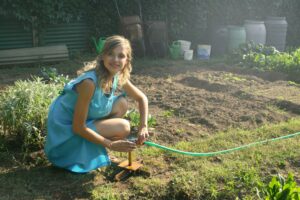Embarking on a gardening journey can be both exhilarating and daunting for beginners. Whether one has a spacious backyard or a few pots on a balcony, cultivating plants is a rewarding endeavor that connects one with nature and fosters a sense of accomplishment. To help one get started on the right foot, here are some invaluable gardening tips tailored for beginners.
Choose the Right Location: Selecting the perfect spot for one’s garden is crucial for its success. Consider factors such as sunlight exposure, drainage, and proximity to water sources. Most plants thrive in areas with ample sunlight, so opt for locations with at least six hours of sunlight per day. Additionally, ensure that the soil drains well to prevent waterlogging, which can lead to root rot. And for those who don’t want to bother gardening- the professionals are here to help!
Start with Easy-to-Grow Plants: As a beginner, it’s wise to begin one’s gardening journey with plants that are resilient and low-maintenance. Herbs like basil, mint, and rosemary, as well as vegetables like tomatoes, lettuce, and peppers, are excellent choices for novice gardeners. These plants typically require minimal attention and provide a rewarding harvest, boosting one’s confidence as one gain experience.
Understand One’s Soil: Before planting anything, take the time to assess one’s soil’s composition and pH level. Most plants thrive in well-draining soil with a pH level ranging from 6.0 to 7.0. one can conduct a simple soil test using a pH meter or testing kits available at garden centers. Based on the results, amend the soil as needed by adding organic matter such as compost or peat moss to improve its texture and fertility.

Provide Adequate Watering: Proper watering is essential for the health and growth of one’s plants. While it’s crucial not to overwater, underwatering can be equally detrimental. Learn to strike a balance by watering one’s plants deeply but infrequently, allowing the soil to dry out slightly between watering sessions. Pay attention to individual plant requirements, as some may need more water than others, especially during hot summer months.
Mulch for Moisture Retention: Applying a layer of mulch around one’s plants offers multiple benefits, including moisture retention, weed suppression, and soil insulation. Organic mulches such as shredded bark, straw, or compost not only conserve water by reducing evaporation but also enrich the soil as they decompose. Spread a two to three-inch layer of mulch evenly around one’s plants, leaving space around the stems to prevent rotting.
Practice Regular Maintenance: Consistent maintenance is key to keeping one’s garden thriving throughout the growing season. Schedule regular tasks such as weeding, pruning, and fertilizing to promote healthy growth and prevent pest and disease infestations. Remove weeds promptly to prevent them from competing with one’s plants for nutrients and water, and prune dead or overgrown branches to encourage new growth.
Learn from Experience: Gardening is a continuous learning process, and every success and setback presents an opportunity to learn and improve. Take note of what works well in one’s garden and what doesn’t, and don’t be afraid to experiment with different plants, techniques, and strategies. Joining gardening communities or forums can also provide valuable insights and support from experienced gardeners.Embrace Patience: Finally, remember that gardening requires patience and perseverance. It takes time for seeds to germinate, plants to grow, and fruits and flowers to develop. Be patient with one’sself and one’s garden, and enjoy the journey as one witness the miraculous transformation from seed to harvest.

Companion Planting: Explore the concept of companion planting, which involves growing certain plants together to enhance growth, deter pests, and improve overall garden health. For example, planting marigolds alongside tomatoes can help repel nematodes, while interplanting aromatic herbs like basil and lavender can attract beneficial insects that prey on garden pests.
Seasonal Planning: Plan one’s garden laonet and plant selection according to the seasons in one’s region. Research the recommended planting dates for different crops and stagger one’s plantings to ensure a continuous harvest throughout the growing season. Consider incorporating a mix of cool-season and warm-season crops to maximize productivity and diversity in one’s garden.
Invest in Quality Tools: Investing in high-quality gardening tools can make one’s gardening tasks more efficient and enjoyable. Start with essential tools such as a sturdy shovel, hand trowel, pruning shears, and watering can. Opt for ergonomic designs that fit comfortably in one’s hands and prioritize durability to ensure longevity.
Practice Pest and Disease Management: Be proactive in preventing and managing pests and diseases in one’s garden to safeguard one’s plants’ health and productivity. Regularly inspect one’s plants for signs of pest infestation or disease symptoms, such as yellowing leaves, holes in foliage, or moldy patches. Employ organic pest control methods whenever possible, such as handpicking pests, applying neem oil or insecticidal soap, and practicing crop rotation.
Harvest and Preserve: Enjoy the fruits of one’s labor by harvesting one’s crops at their peak ripeness for optimal flavor and nutrition. Use sharp scissors or pruners to harvest fruits, vegetables, and herbs, and handle them gently to avoid bruising or damage. Explore different methods of preserving one’s harvest, such as canning, freezing, drying, or fermenting, to extend the enjoyment of homegrown produce beyond the growing season.
Incorporate Pollinator-Friendly Plants: Support pollinators such as bees, butterflies, and hummingbirds by incorporating pollinator-friendly plants into one’s garden. Choose nectar-rich flowers like bee balm, coneflowers, and lavender, as well as native plant species that provide food and habitat for local pollinator populations. By attracting pollinators to one’s garden, one will not only enhance plant fertility but also contribute to biodiversity conservation efforts.

Stay Flexible and Adapt: Gardening is inherently unpredictable, and unforeseen challenges may arise along the way. Stay flexible and be prepared to adapt one’s plans and strategies as needed to address changing weather conditions, pest outbreaks, or other unexpected developments. Embrace the inherent variability of nature and view each challenge as an opportunity to learn and grow as a gardener.
Embarking on a gardening journey as a beginner may seem daunting at first, but with the right knowledge and guidance, it can be a deeply rewarding experience. By following these essential tips and embracing the joys and challenges of gardening, one will soon cultivate a thriving garden that brings beauty, sustenance, and joy to one’s life. So roll up one’s sleeves, dig in the dirt, and let one’s green thumb flourish! And always remember – the professionals are here to help!





